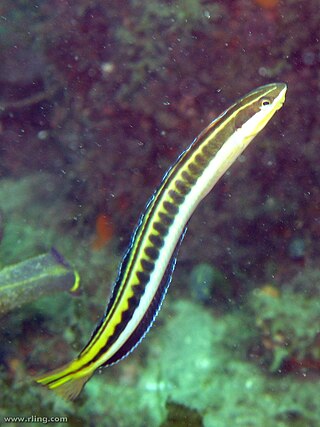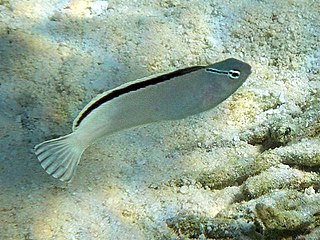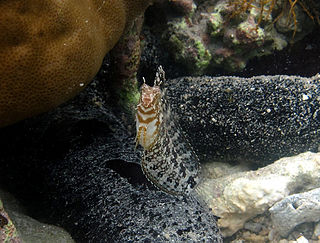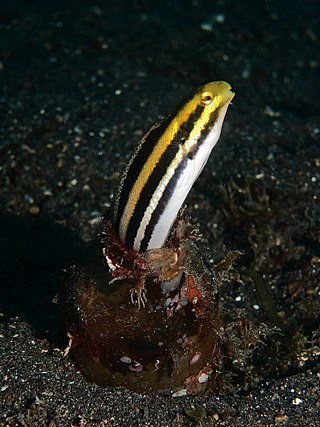
Combtooth blennies are blenniiformids; percomorph marine fish of the family Blenniidae, part of the order Blenniiformes. They are the largest family of blennies with around 401 known species in 58 genera. Combtooth blennies are found in tropical and subtropical waters in the Atlantic, Pacific and Indian Oceans; some species are also found in brackish and even freshwater environments.

Blenny is a common name for many types of fish, including several families of percomorph marine, brackish, and some freshwater fish sharing similar morphology and behaviour. Six families are considered "true blennies", grouped under the order Blenniiformes; its members are referred to as blenniiformids. About 151 genera and nearly 900 species have been described within the order. The order was formerly classified as a suborder of the Perciformes but the 5th Edition of Fishes of the World divided the Perciformes into a number of new orders and the Blenniiformes were placed in the percomorph clade Ovalentaria alongside the such taxa as Cichliformes, Mugiliformes and Gobiesociformes.

Meiacanthus grammistes, the striped blenny, also called the striped fang blenny, grammistes blenny, line-spot harptail blenny or striped poison-fang blenny, is a species of combtooth blenny from the western Pacific Ocean. The fish stays in the open ocean, but travels into shallow saltwater and brackish estuaries. This venomous species occasionally makes its way into the aquarium trade.

Plagiotremus is a genus of combtooth blennies found throughout the Pacific and Indian oceans.
Alloblennius is a genus of combtooth blennies found in the western and northeastern Indian Ocean.

Alticus is a genus of combtooth blennies found in the Pacific and Indian oceans. It is one of 57 genera in the family Blenniidae.

The Kirk's blenny is a species of combtooth blenny in the genus Alticus. It was described by A. Günther in 1964, originally as a member of the genus Salarias. It is a tropical blenny which is known from the Red Sea, Mozambique, Réunion, the Persian Gulf, and India, in the Indian Ocean. Kirk's blennies inhabit waters near the shore, and often spend time out of the water. They are able to breathe air when on land. They are oviparous, and form distinct pairs when mating; they also guard their eggs.
Meiacanthus ditrema, the one-striped poison-fang blenny, is a species of combtooth blenny found in coral reefs in the western Pacific ocean. This species grows to a length of 6 centimetres (2.4 in) TL.
Meiacanthus limbatus, the Manus fangblenny, is a species of combtooth blenny found in the western central Pacific Ocean, around Papua New Guinea. This species grows to a length of 3.7 centimetres (1.5 in) SL.
Meiacanthus naevius, the birthmark fangblenny, is a species of combtooth blenny found in the eastern Indian Ocean, around western Australia. This species grows to a length of 3.6 centimetres (1.4 in) SL.

Meiacanthus smithi, the disco blenny, is a species of combtooth blenny found in coral reefs in the eastern Indian Ocean. This species grows to a length of 8.5 centimetres (3.3 in) TL. It is also commonly known as Smith's fangblenny, Smith's sawtail blenny or Smith's harp-tail blenny. This species is also found in the aquarium trade.
Meiacanthus vittatus, the one-striped fangblenny, is a species of combtooth blenny found in coral reefs in the western Pacific ocean. This species grows to a length of 8.5 centimetres (3.3 in) TL. This species can be found in the aquarium trade.

Petroscirtes is a genus of combtooth blennies found in the western Pacific, and Indian oceans. Some species of this genus have venom that interacts with opioid receptors. Adults usually inhabit coastal reefs and estuaries to depths of about 10 meters, but they can also be found up to 15 meters in depth in sandy and weedy areas among clumps of Sargassum or other seaweeds in coastal and lagoon reefs. They can be found in nests inside small-necked bottles and abandoned worm tubes or shells.

Petroscirtes breviceps, the striped poison-fang blenny mimic, striped fangblenny mimic, short-head sabretooth blenny, short-headed blenny, sabretooth blenny, or the black-banded blenny, is a species of combtooth blenny found in coral reefs in the western Pacific and Indian Ocean. This species reaches a length of 11 centimetres (4.3 in) SL.

Plagiotremus goslinei, commonly known as the biting blenny, Gosline's fangblenny, the scale-eating blenny, the Ewa fang blenny, the blue-stripe blenny, or the scale-eating fang blenny, is a species of combtooth blenny. The species epithet honours the American ichthyologist William A. Gosline (1915-2002) of the University of Hawaiʻi.

Plagiotremus phenax, the Imposter fangblenny, is a species of combtooth blenny found in coral reefs in the Indian Ocean. This species reaches a length of 8 centimetres (3.1 in) TL. This blenny uses bio mimicry to avoid predation, as it has a strong resemblance to the disco blenny.

Plagiotremus laudandus, the bicolour fangblenny, false harptail-blenny, poison-fang blenny mimic, yellow-tailed blenny or the yellowtail fangblenny mimic, is a species of combtooth blenny found in coral reefs in the western Pacific ocean. This species reaches a length of 8 centimetres (3.1 in) TL. This species is a Batesian mimic of Meiacanthus atrodorsalis.

Ostorhinchus is a genus of ray-finned fish in the family Apogonidae native to the Indian and Pacific Oceans.
Adelotremus is a small genus of combtooth blennies which are found in the Indo-Pacific region. The name of the genus is a compound of the Greek Adelos meaning "concealed" and trema meaning "hole", this was coined to reflect that the type of Adelotremus leptus was discovered hiding in a tube made by a polychaete.













